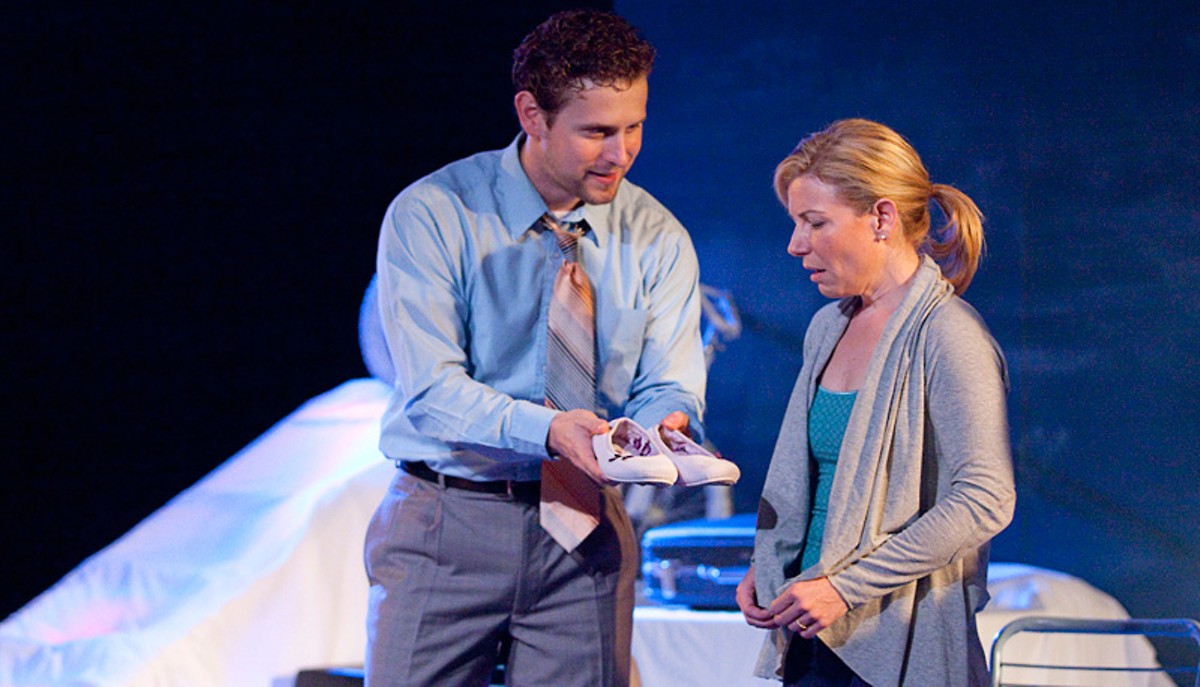Have you ever tried to find your way through a maze? From the outside, it looks like challenging good fun. But getting lost in one can be a disorienting, even terrifying, experience. God's Ear by Jenny Schwartz is a maze of a script that uses language to confound and bewilder us. This surreal journey through the fractured mind of a young mother who is waiting for her son to die asks much – not only of its actors, but also of its audience.
When the evening begins, we hear the dire sounds of a hospital emergency room. Then Mel, the grief-stricken mother (Michelle Hand), talks to her husband (Martin Fox) about the condition of their doomed son: "He's in a coma. He's hooked up to a respirator. He has a pulse. He has brain damage." These terse, factual sentences are perhaps the most succinct of the entire evening, at least until the final minute.
Although God's Ear lasts eighty minutes (without intermission), it may be that the action onstage plays out in just a few seconds. Time is not at issue here, perhaps because nightmares wreak havoc on conventional time. Unable to process the unthinkable reality of losing a son, Mel proceeds to imagine other traumas that somehow seem more endurable – her husband being hijacked on an airplane, her husband having an affair with a sexy hooker (Kelly Schnider). "I'm floating around in my mind," Mel tells us. She takes refuge in a bizarredreamscape peopled by the likes of the Tooth Fairy (Donna Weinsting) and action figure GI Joe (Justin Ivan Brown).
In Mel's mind, words are like bricks. She piles them high to build a barrier that keeps feelings at bay. During that process of building, we viewers must absorb the excessive dialogue. The evening is comprised of tumbling repetitions, banal clichés and speeches so relentlessly labyrinthine they hold us spellbound, if for no other reason than that we want to make sure they finally do end. Although all this verbiage never does quite succumb to gibberish, it reminds us of how much quasi-gibberish we are subjected to every day.
God's Ear is not mainstream material. Because it delights in upending conventional theater norms, it has found a sympathetic hearing at Echo Theatre, a company that disdains complacency. The production has been both directed and designed by Eric Little, whose frigid set is reminiscent of the Ice Palace in David Lean's Doctor Zhivago – a romantic locale for a tale of terror.
But of course nothing is ever as it seems at Echo. Even the playbill's official explanation of this verbal conundrum is disorienting, for it is printed vertically rather than horizontally. In order to read it, you must turn the page sideways. When you do, this is what you read: "God's Ear is, above all, about language– how poorly we use it, how often it fails us, how strange and vital it can be in the midst of desperate need." This analysis (extracted from a review of a recent production in Portland, Oregon) is helpful, as far as it goes. At the same time, it's a challenge for anyone to find the precise words that can elucidate a script whose very theme is the failure of words. Nor can any statement, however succinct, help to solve the evening's most enigmatic riddle, which asks: Are we viewers expected to feel anything as God's Ear unreels, or is this script an academic exercise? That's a question viewers must answer for themselves.






